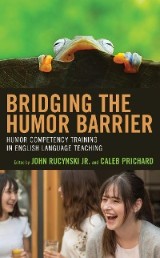Details

Bridging the Humor Barrier
Humor Competency Training in English Language Teaching|
36,99 € |
|
| Verlag: | Lexington Books |
| Format: | EPUB |
| Veröffentl.: | 18.02.2020 |
| ISBN/EAN: | 9781498592017 |
| Sprache: | englisch |
| Anzahl Seiten: | 308 |
DRM-geschütztes eBook, Sie benötigen z.B. Adobe Digital Editions und eine Adobe ID zum Lesen.
Beschreibungen
<span>The language barrier is a familiar term, but what exactly is the humor barrier? Humor is a universal phenomenon, but the cultural variance in how humor is used can prove to be a major obstacle for English language learners hoping to communicate effectively in cross-cultural contexts. While a growing number of researchers have explored the importance of helping language learners better understand the humor of the target culture, in </span>
<span>Bridging the Humor Barrier: Humor Competency Training in English Language Teaching</span>
<span>, editors John Rucynski Jr. and Caleb Prichard bring together language teachers and researchers from a range of cultural and teaching contexts to tackle how to actually overcome the humor barrier. This book empirically examines humor competency training and presents related research bearing implications for humor training. Contributors address a wide range of genres of humor, providing fresh insights into helping language learners deepen their understanding and appreciation of the humor of the English-speaking world, including jokes, sarcasm, and satire. This book is an excellent resource for English language teachers looking to help their learners avoid the pitfalls and reap the benefits of humor in the target language.</span>
<span>Bridging the Humor Barrier: Humor Competency Training in English Language Teaching</span>
<span>, editors John Rucynski Jr. and Caleb Prichard bring together language teachers and researchers from a range of cultural and teaching contexts to tackle how to actually overcome the humor barrier. This book empirically examines humor competency training and presents related research bearing implications for humor training. Contributors address a wide range of genres of humor, providing fresh insights into helping language learners deepen their understanding and appreciation of the humor of the English-speaking world, including jokes, sarcasm, and satire. This book is an excellent resource for English language teachers looking to help their learners avoid the pitfalls and reap the benefits of humor in the target language.</span>
<span>Humor competence in the target language is an overlooked tool for English language learners to communicate confidently and proficiently in English. In this innovative edited collection, language teachers and researchers from around the globe share their latest research on helping learners to overcome the humor barrier.</span>
<span>Introduction</span>
<br>
<br>
<span>John Rucynski Jr. and Caleb Prichard</span>
<br>
<br>
<span>Part 1: Humor Competence Development Outside the Class</span>
<br>
<br>
<span>Chapter 1</span>
<span>:</span>
<span>“Working Backwards from Funny: Preparing Language Learners to Use Humor in Intercultural Encounters”</span>
<br>
<br>
<span>Anne Pomerantz</span>
<br>
<br>
<span>Chapter 2</span>
<span>:</span>
<span>“Humor Competency: The Role of Sociopragmatic Knowledge in Expressions of Humor in Intercultural Interactions”</span>
<br>
<br>
<span>Jules Winchester</span>
<br>
<br>
<span>Chapter 3</span>
<span>:</span>
<span>“Feeling Inadequate: Lessons from Cross-Cultural Adaptation to Help Learners Get over Inadequacies in Humor Competency”</span>
<br>
<br>
<span>Maria Ramirez de Arellano</span>
<br>
<br>
<span>Part 2: Integrated Humor Instruction</span>
<br>
<br>
<span>Chapter 4</span>
<span>:</span>
<span>“Humor-Integrated Language Learning (HILL): Teaching with and about Humor”</span>
<br>
<br>
<span>Mohammad Ali Heidari-Shahreza</span>
<br>
<br>
<span>Chapter 5</span>
<span>:</span>
<span>“Junior High English Textbook Interactional Humor: Pragmatic Possibilities”</span>
<br>
<br>
<span>Scott Gardner</span>
<br>
<br>
<span>Chapter 6</span>
<span>:</span>
<span>“Reading Jokes in English: How English Language Learners Appreciate and Comprehend Humor”</span>
<br>
<br>
<span>Nadezda Pimenova</span>
<br>
<br>
<span>Part 3: Explicit Humor Competency Training</span>
<br>
<br>
<span>Chapter 7</span>
<span>:</span>
<span>“Humor Competency Training for Sarcasm and Jocularity”</span>
<br>
<br>
<span>Caleb Prichard and John Rucynski Jr.</span>
<br>
<br>
<span>Chapter 8</span>
<span>:</span>
<span>“Theory, Content Knowledge, Input, Output: Elements in the Teaching and Learning of Humor Competence”</span>
<br>
<br>
<span>Richard Hodson</span>
<br>
<br>
<span>Chapter 9</span>
<span>:</span>
<span>“Using Diaries to Research and Develop Humor Competence in a Second Language”</span>
<br>
<br>
<span>Maria Petkova</span>
<br>
<br>
<span>Chapter 10</span>
<span>:</span>
<span>“Training English Language Learners to</span>
<span> Recognize E</span>
<span>nglish Satirical News”</span>
<br>
<br>
<span>John Rucynski Jr. and Caleb Prichard</span>
<br>
<br>
<span>John Rucynski Jr. and Caleb Prichard</span>
<br>
<br>
<span>Part 1: Humor Competence Development Outside the Class</span>
<br>
<br>
<span>Chapter 1</span>
<span>:</span>
<span>“Working Backwards from Funny: Preparing Language Learners to Use Humor in Intercultural Encounters”</span>
<br>
<br>
<span>Anne Pomerantz</span>
<br>
<br>
<span>Chapter 2</span>
<span>:</span>
<span>“Humor Competency: The Role of Sociopragmatic Knowledge in Expressions of Humor in Intercultural Interactions”</span>
<br>
<br>
<span>Jules Winchester</span>
<br>
<br>
<span>Chapter 3</span>
<span>:</span>
<span>“Feeling Inadequate: Lessons from Cross-Cultural Adaptation to Help Learners Get over Inadequacies in Humor Competency”</span>
<br>
<br>
<span>Maria Ramirez de Arellano</span>
<br>
<br>
<span>Part 2: Integrated Humor Instruction</span>
<br>
<br>
<span>Chapter 4</span>
<span>:</span>
<span>“Humor-Integrated Language Learning (HILL): Teaching with and about Humor”</span>
<br>
<br>
<span>Mohammad Ali Heidari-Shahreza</span>
<br>
<br>
<span>Chapter 5</span>
<span>:</span>
<span>“Junior High English Textbook Interactional Humor: Pragmatic Possibilities”</span>
<br>
<br>
<span>Scott Gardner</span>
<br>
<br>
<span>Chapter 6</span>
<span>:</span>
<span>“Reading Jokes in English: How English Language Learners Appreciate and Comprehend Humor”</span>
<br>
<br>
<span>Nadezda Pimenova</span>
<br>
<br>
<span>Part 3: Explicit Humor Competency Training</span>
<br>
<br>
<span>Chapter 7</span>
<span>:</span>
<span>“Humor Competency Training for Sarcasm and Jocularity”</span>
<br>
<br>
<span>Caleb Prichard and John Rucynski Jr.</span>
<br>
<br>
<span>Chapter 8</span>
<span>:</span>
<span>“Theory, Content Knowledge, Input, Output: Elements in the Teaching and Learning of Humor Competence”</span>
<br>
<br>
<span>Richard Hodson</span>
<br>
<br>
<span>Chapter 9</span>
<span>:</span>
<span>“Using Diaries to Research and Develop Humor Competence in a Second Language”</span>
<br>
<br>
<span>Maria Petkova</span>
<br>
<br>
<span>Chapter 10</span>
<span>:</span>
<span>“Training English Language Learners to</span>
<span> Recognize E</span>
<span>nglish Satirical News”</span>
<br>
<br>
<span>John Rucynski Jr. and Caleb Prichard</span>
<span>John Rucynski Jr.</span>
<span> is associate professor in the Center for Liberal Arts and Language Education at Okayama University.<br><br></span>
<span>Caleb Prichard</span>
<span> is associate professor in the Center for Liberal Arts and Language Education at Okayama University.</span>
<span> is associate professor in the Center for Liberal Arts and Language Education at Okayama University.<br><br></span>
<span>Caleb Prichard</span>
<span> is associate professor in the Center for Liberal Arts and Language Education at Okayama University.</span>

















